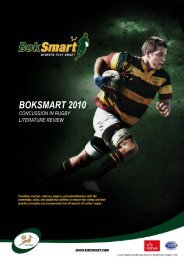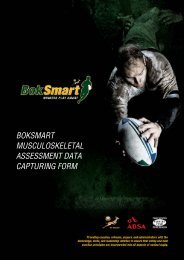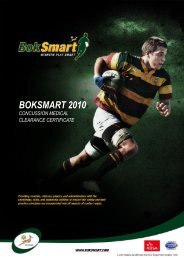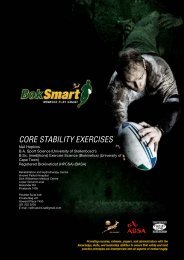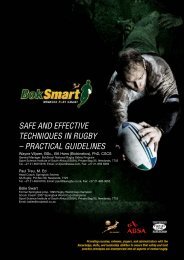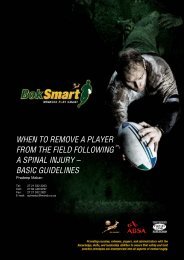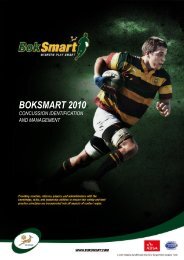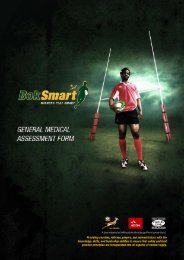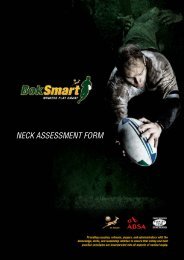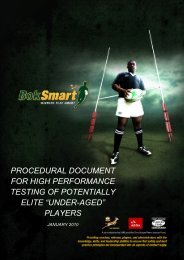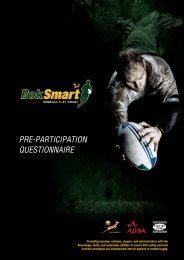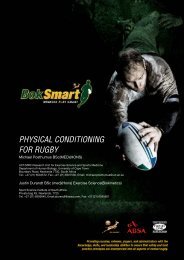FRONT PAGE HEADING PRACTICAL NUTRITION FOR ... - SA Rugby
FRONT PAGE HEADING PRACTICAL NUTRITION FOR ... - SA Rugby
FRONT PAGE HEADING PRACTICAL NUTRITION FOR ... - SA Rugby
Create successful ePaper yourself
Turn your PDF publications into a flip-book with our unique Google optimized e-Paper software.
Practical Nutrition for <strong>Rugby</strong><br />
• Cooling strategies are very important to prevent heatstroke in hot conditions. These include<br />
staying in the shade during breaks and removing warm jerseys; using cold-water ice packs and<br />
side-line fans, etc.<br />
Allowing athletes to acclimatise to hot conditions for 7-10 days should also be a component of managing<br />
potential heat illness.<br />
ALCOHOL<br />
In team sports, the culture may often promote post-game alcohol binges. Alcohol reduces reaction time,<br />
and impairs balance, accuracy, hand-eye co-ordination, strength, power and endurance, and impairs<br />
body temperature regulation. Alcohol also increases high-risk behaviour that may lead to poor judgement<br />
and reduced inhibition, accidents, injuries and even death. Alcohol also distracts from sound recovery<br />
strategies, injury treatment and sleep. Drinking alcohol after a match interferes with the recovery of the<br />
body’s carbohydrate stores, and acts as a diuretic, thereby increasing urinary fluid losses and so<br />
delaying rehydration. Alcohol also has a vasodilatory effect, which can increase bleeding and swelling,<br />
thus delaying or slowing recovery of soft-tissue damage and rehabilitation from injury. (Refer to Injury and<br />
Rehabilitation).<br />
With an energy density of 29kJ (7kcal)/gram, alcohol can contribute significantly to daily energy intake,<br />
causing fat gain. Alcohol may also lead to increased storage of dietary fat, as it is a preferred fuel and so<br />
suppresses the oxidation of fat, which is then stored.<br />
<strong>PRACTICAL</strong> TIPS<br />
1. Adhere to the 24-hour rule, i.e. - avoid alcohol in the 24 hours before a match and in the 24<br />
hours after a match, if any soft tissue injuries or bruising have occurred. Some teams may have a<br />
ban on alcohol intake!<br />
2. Ensure that plenty of non-alcoholic drinks are available after training or a match. Those players<br />
who choose to drink alcohol should ensure that they are adequately rehydrated and refueled<br />
with carbohydrates and fluid before drinking alcoholic drinks which in any case should be limited.<br />
3. Note that although some alcoholic beverages do contain carbohydrate (e.g. beer) the alcohol<br />
content of the drink is a diuretic and inhibits the restoration of glycogen in the muscles. This<br />
affects performance and recovery therefore players should rather resort to other more<br />
appropriate sources of carbohydrate (Refer to Carbohydrate).<br />
4 Copyright BokSmart © 2009



